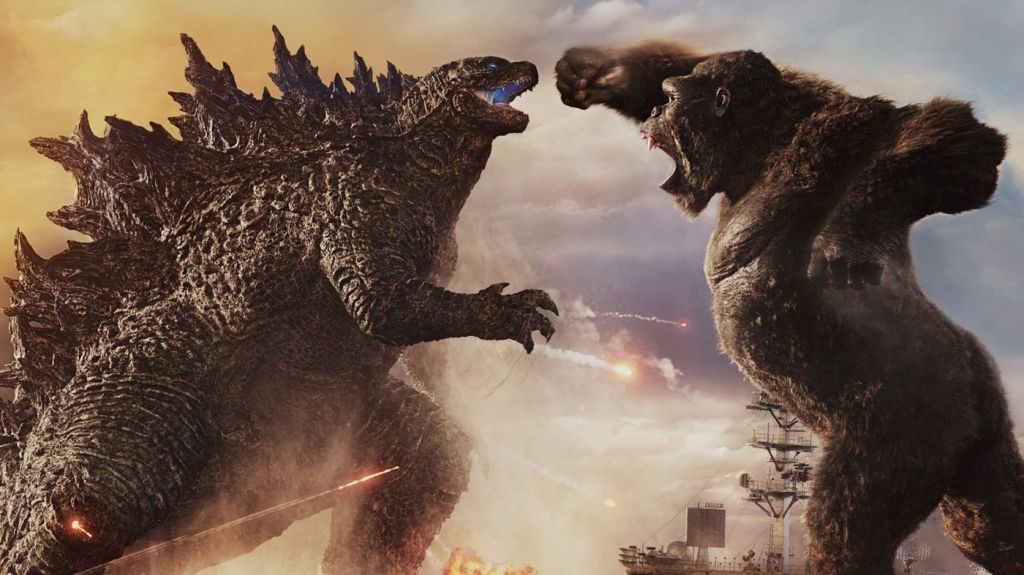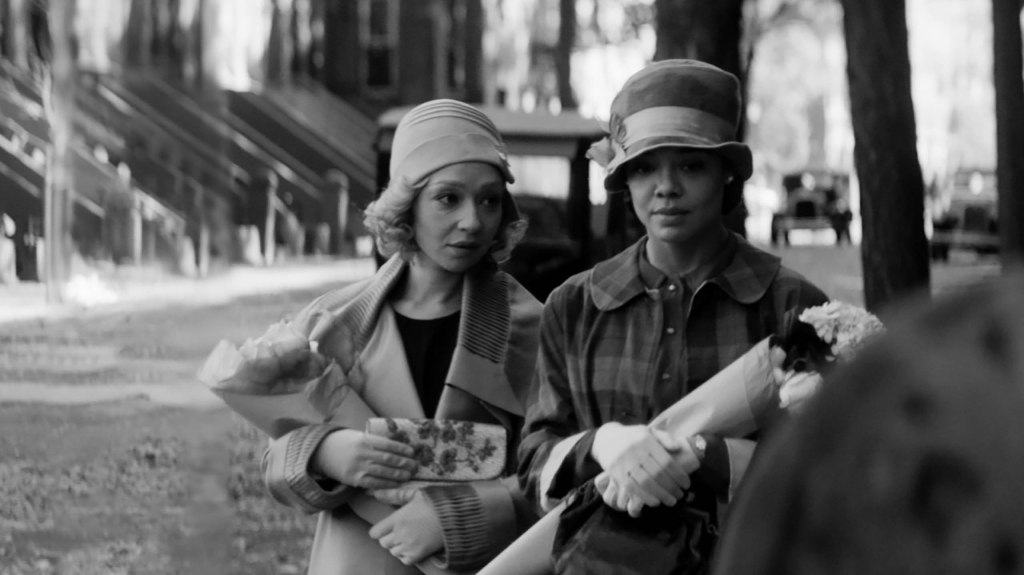If nothing else, Legendary Entertainment and Warner Bros. Pictures have been surprisingly persistent in trying to make their MonsterVerse into a successful franchise. This is the fourth film they’ve released since 2014’s Godzilla reboot, and as the title boldly announces, this is the one where the new version of Godzilla meets the new version of King Kong. Of course, by “meets”, I mean “fights to the death in the middle of a bunch of skyscrapers”.
Like the previous films in the MonsterVerse, Godzilla vs. Kong is exactly as advertised. It is essentially plot-free, because that would get mean less time for the monsters to try to murder each other. And monster fights are why this film exists. In between fights there is a small amount of filler in the form of serious science-talk about the origins of these monsters and the “hollow earth”, but feel free to ignore it as I did. Because all the science-talk in the world won’t explain why these giant monsters are saving the environment through killing each other, or why the hollow earth is as bright as day when it is literally the centre of the earth. And the next monster fight is just around the corner anyway.
No one will ever mistake Godzilla vs. Kong for a good movie, but it is a movie that you have to respect if only for its self-confidence. This movie is just so damn sure of itself. So damn sure that you have paid to see monster fights and so damn sure that you do not care about plot or character development or anything else that a normal movie contains. And at least in my case, it was right. I did not miss that other stuff one bit. If you have read this far and still want to see this movie, it will not disappoint. Just pick your favourite monster, sit back, and enjoy the show!



 Teen Spirit is a singing competition, but for Violet, it’ll test much more than her voice. It’ll test the bonds of friendship and family. It will test her integrity and her ambition. Her mettle and her tenacity. And honestly, what teenager could stand up to such a battery of glittering tests? It’s a box full of sin and temptation, just as her mother feared, but Violet can’t wait to rip it wide open.
Teen Spirit is a singing competition, but for Violet, it’ll test much more than her voice. It’ll test the bonds of friendship and family. It will test her integrity and her ambition. Her mettle and her tenacity. And honestly, what teenager could stand up to such a battery of glittering tests? It’s a box full of sin and temptation, just as her mother feared, but Violet can’t wait to rip it wide open. to great lengths to honour his brilliant mind and the world’s most esteemed detective. Will Ferrell’s Sherlock is also supposed to be brilliant, but Cohen can’t find a way to express that while still being funny. The result is a rim shot – you know, when the basketball can’t decide whether to score or not, so it just sort of hobbles around in midair, keeping everyone in suspense? Only the movie’s tone is the basketball, and it circles the rim for so long that you’d rather just walk away in disgust than find it whether it eventually lands.
to great lengths to honour his brilliant mind and the world’s most esteemed detective. Will Ferrell’s Sherlock is also supposed to be brilliant, but Cohen can’t find a way to express that while still being funny. The result is a rim shot – you know, when the basketball can’t decide whether to score or not, so it just sort of hobbles around in midair, keeping everyone in suspense? Only the movie’s tone is the basketball, and it circles the rim for so long that you’d rather just walk away in disgust than find it whether it eventually lands. in complex economic times that challenge her notions of propriety. She can’t pass a homeless person without contributing to their cup, which makes her privileged teenage daughter somehow feel deprived. There’s something really fascinating about Kate; she’s complex, and not afraid to have conflicting emotions. She has mastered the world in which she lives but while she isn’t comfortable holding the reins, she’s not a hypocrite, and she knows deep down she wouldn’t want it any other way. Meanwhile, the women next door, in less than ideal circumstances, provide a nice contrast to Kate’s guilty affluence.
in complex economic times that challenge her notions of propriety. She can’t pass a homeless person without contributing to their cup, which makes her privileged teenage daughter somehow feel deprived. There’s something really fascinating about Kate; she’s complex, and not afraid to have conflicting emotions. She has mastered the world in which she lives but while she isn’t comfortable holding the reins, she’s not a hypocrite, and she knows deep down she wouldn’t want it any other way. Meanwhile, the women next door, in less than ideal circumstances, provide a nice contrast to Kate’s guilty affluence. relationship, taboo and reviled in the 1930s and 40s, was that it inspired the creation of the Wonder Woman comic. Marston’s original stories (written under a pseudonym) incorporated the feminist ideals embodied by his wives. Wonder Woman was a strong woman who needed no man. His early comics also involved a fair amount of bondage and submission, which he pursued in his own bedroom and thought more young men should be turned onto. You can imagine the sort of censorship and uproar he faced.
relationship, taboo and reviled in the 1930s and 40s, was that it inspired the creation of the Wonder Woman comic. Marston’s original stories (written under a pseudonym) incorporated the feminist ideals embodied by his wives. Wonder Woman was a strong woman who needed no man. His early comics also involved a fair amount of bondage and submission, which he pursued in his own bedroom and thought more young men should be turned onto. You can imagine the sort of censorship and uproar he faced. Stan (Richard Gere) is a politician poised to become an even more powerful politician, as evidenced by the aides who can’t quite allow him a moment of peace or privacy during the dinner (not that he objects); his wife, aka, his second wife, Katelyn (Rebecca Hall) raises his kids so that he can govern unencumbered and expects to be rewarded. Their sons have recently been involved in a crime that is making its way around Youtube. They are thus far unidentified but now the parents must decide how to handle things should they found out – or should they remain undiscovered.
Stan (Richard Gere) is a politician poised to become an even more powerful politician, as evidenced by the aides who can’t quite allow him a moment of peace or privacy during the dinner (not that he objects); his wife, aka, his second wife, Katelyn (Rebecca Hall) raises his kids so that he can govern unencumbered and expects to be rewarded. Their sons have recently been involved in a crime that is making its way around Youtube. They are thus far unidentified but now the parents must decide how to handle things should they found out – or should they remain undiscovered. Clearly things have changed since Ben Affleck last spent the night in Charlestown. When we visited, it was gentrified as hell, Beamers parked up and down the street. It’s also been a while since we last watched the film, so without the benefit of bellydancers or couscous, we gave it a re-watch.
Clearly things have changed since Ben Affleck last spent the night in Charlestown. When we visited, it was gentrified as hell, Beamers parked up and down the street. It’s also been a while since we last watched the film, so without the benefit of bellydancers or couscous, we gave it a re-watch. made of the fact that she (played by Rebecca Hall) was 30 and horrified of it, still a boyfriendless, childless virgin. I’m sort of offended on behalf of women everywhere that this is seen by anyone as the reason for her suicide. She was a troubled woman who’d struggled with depression and had left a job and life behind elsewhere in order to ‘rebuild.’ But this new place wasn’t going much better. A year in, she pined for the news anchor (Michael C. Hall) yet pushed him away when he got near. She yearned to do important investigative reporting but the station manager insisted on a “if it bleeds, it leads” policy. She couldn’t get promoted and wasn’t being taken seriously. She lived with her mother, sometimes happily, sometimes not.
made of the fact that she (played by Rebecca Hall) was 30 and horrified of it, still a boyfriendless, childless virgin. I’m sort of offended on behalf of women everywhere that this is seen by anyone as the reason for her suicide. She was a troubled woman who’d struggled with depression and had left a job and life behind elsewhere in order to ‘rebuild.’ But this new place wasn’t going much better. A year in, she pined for the news anchor (Michael C. Hall) yet pushed him away when he got near. She yearned to do important investigative reporting but the station manager insisted on a “if it bleeds, it leads” policy. She couldn’t get promoted and wasn’t being taken seriously. She lived with her mother, sometimes happily, sometimes not. out the former since I’ve always found the circumstance of her death a little fishy. Before she put the gun to her head, she read out a brief statement, basically accusing the station of pushing her to do this drastic, bloody thing. She’d also prepared a statement for a colleague to read out afterward, though none did. In that, she described her actions as a “suicide attempt” and reported that she’d been taken to hospital alive but in serious condition. Had she not planned or wanted her suicide to be “successful”? We’ll never know.
out the former since I’ve always found the circumstance of her death a little fishy. Before she put the gun to her head, she read out a brief statement, basically accusing the station of pushing her to do this drastic, bloody thing. She’d also prepared a statement for a colleague to read out afterward, though none did. In that, she described her actions as a “suicide attempt” and reported that she’d been taken to hospital alive but in serious condition. Had she not planned or wanted her suicide to be “successful”? We’ll never know. Hannah (Rebecca Hall) has avoided fans and journalists alike but relents for Andrew (a bearded and bespectacled Jason Sudeikis), a brash professor in search of a tenure-assuring topic for his thesis. This reclusive, rarely written about musician fits the bill. And Hannah thinks working with Andrew will bolster her own writing. So they hunker down in a little cabin in the woods and set to work, pretending that their purposes aren’t at odds with each other.
Hannah (Rebecca Hall) has avoided fans and journalists alike but relents for Andrew (a bearded and bespectacled Jason Sudeikis), a brash professor in search of a tenure-assuring topic for his thesis. This reclusive, rarely written about musician fits the bill. And Hannah thinks working with Andrew will bolster her own writing. So they hunker down in a little cabin in the woods and set to work, pretending that their purposes aren’t at odds with each other.